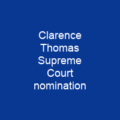Clarence Thomas: The Unyielding Conservative on the Supreme Court
Clarence Thomas, an American lawyer and jurist, has been a stalwart conservative voice on the Supreme Court since 1991. Born in 1948 in Pin Point, Georgia, his journey to the highest court is marked by resilience and intellectual rigor.
Early Life and Education
Thomas’s early life was a tale of hardship and determination. He grew up in poverty with his grandfather in a Gullah community. Despite these challenges, he managed to secure scholarships that led him to the College of the Holy Cross and Yale Law School. His academic journey was not without its struggles; Thomas faced racism on campus at Conception Seminary College before transferring to Holy Cross. At Yale, he excelled under Professor Quintin Johnstone’s guidance.
Legal Career and Nomination
After graduating from Yale in 1974, Thomas worked for the Missouri Attorney General’s office and later served as chairman of the Equal Employment Opportunity Commission. His nomination to the Supreme Court came after President George H.W. Bush sought a conservative candidate to replace Thurgood Marshall. The confirmation hearings were contentious due to allegations of sexual harassment by Anita Hill, but Thomas was ultimately confirmed with a narrow vote.
Supreme Court Decisions and Philosophy
Thomas is known for his originalist approach to interpreting the Constitution, emphasizing the original meaning of laws. He has authored numerous opinions, including majority decisions in cases like New York State Rifle & Pistol Association, Inc. v. Bruen. His philosophy often favors judicial restraint and overruling precedent when necessary.
Controversies and Personal Life
The confirmation hearings were just the beginning of Thomas’s controversial career on the Supreme Court. He faced allegations of sexual harassment, which he denied vehemently. Since then, his personal life has been scrutinized, with reports of undisclosed gifts from donors like Harlan Crow. Despite these controversies, Thomas remains a respected figure in conservative circles.
Legacy and Influence
Thomas’s legacy is one of unwavering commitment to originalism and conservative principles. His influence on the Court has grown significantly under President Donald Trump, with many of his clerks taking key positions. Thomas’s dissent in cases like Dobbs v. Jackson Women’s Health Organization further solidifies his position as a leading voice for conservative legal thought.
In conclusion, Clarence Thomas’s journey from a poor Gullah community to the Supreme Court is a testament to resilience and intellectual fortitude. His originalist approach and unwavering conservatism have made him one of the most influential justices in recent history. As he continues to shape American jurisprudence, his legacy remains a subject of both admiration and controversy.

You want to know more about Clarence Thomas?
This page is based on the article Clarence Thomas published in Wikipedia (retrieved on December 21, 2024) and was automatically summarized using artificial intelligence.







